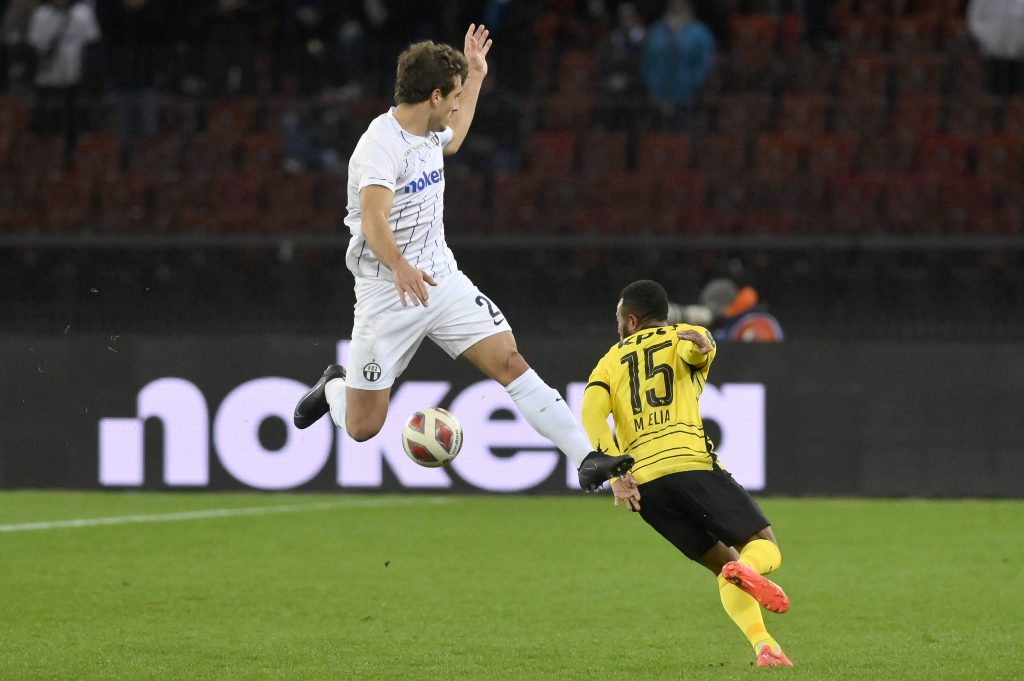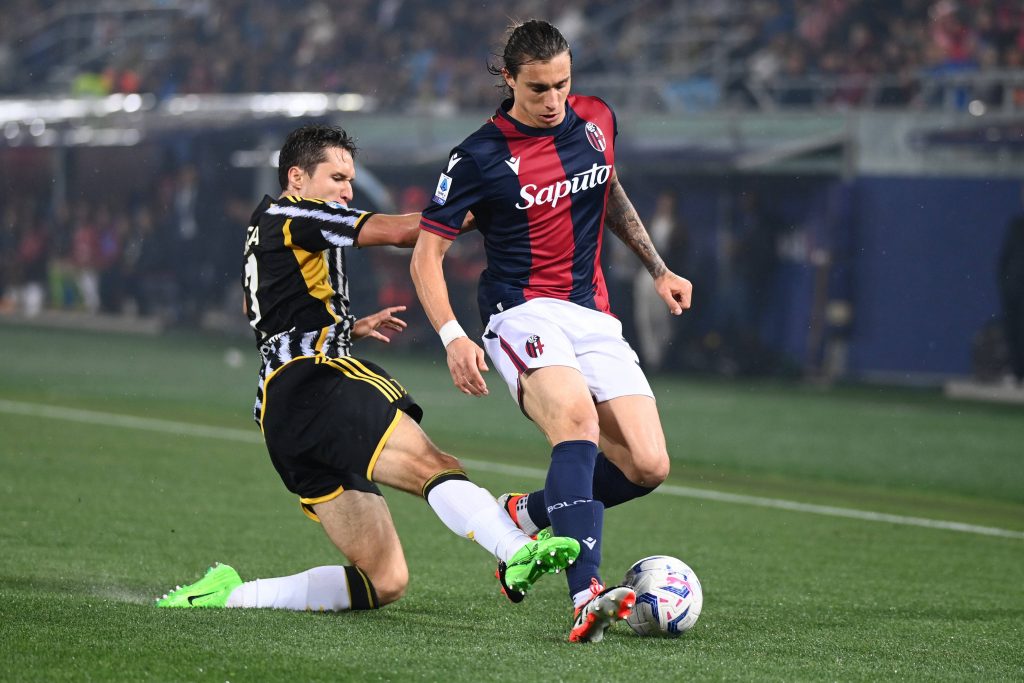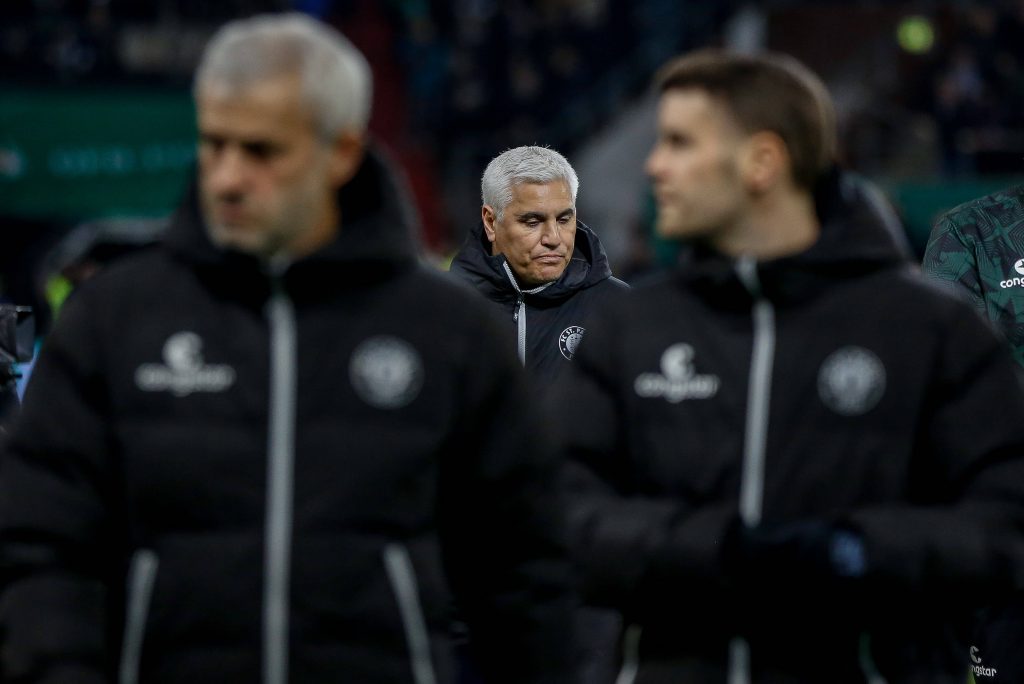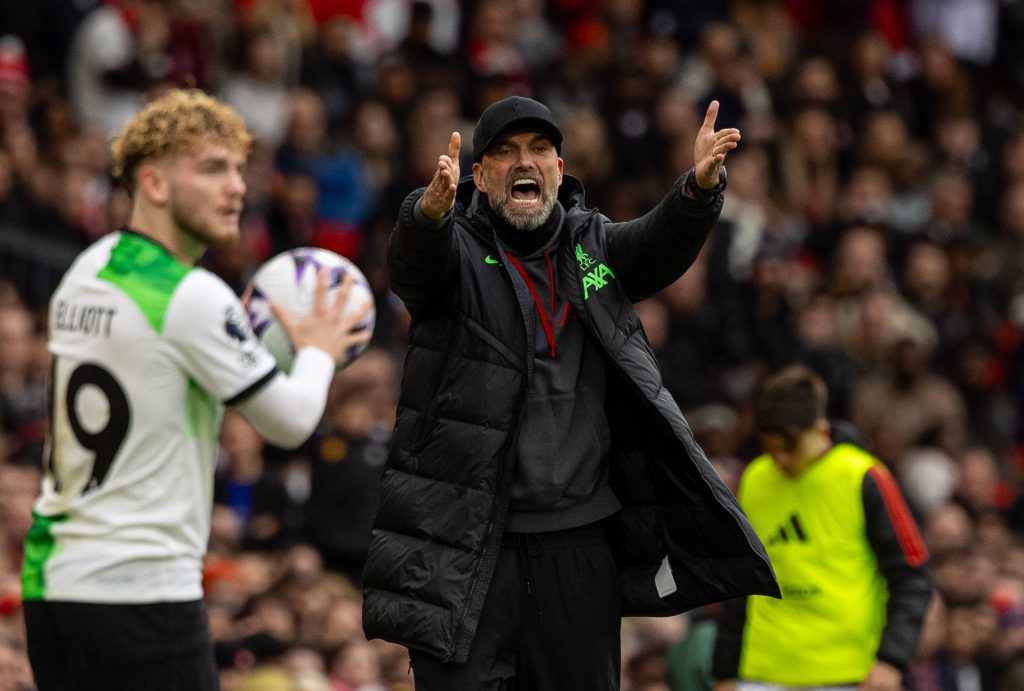Neel Shelat looks at how the team went from mid-table to glory, before stuttering badly, and explains how managerial appointments and transfers can make or break the period after success
It’s not too often that we can accurately sum up a club’s season with the title of a much-memed DJ Khaled album, but FC Zürich are giving us that opportunity this season. In exchange, we will gladly investigate why this is an apt description of their fortunes as well as the factors that led to this.
First of all, let us get a bit of background on the club. Founded in the late 19th century by members of local clubs including a certain Joan Gamper (who would go on to form Barcelona), FCZ have a long and storied history. They won their first top-flight title in 1902 and added a second in 1923, but then mostly drifted between the top two tiers for the subsequent 35 or so years.
After that, FC Zürich entered the most successful period in their history from the 1960s onwards. They won seven league titles and five cups in a 19-year spell between 1962 and 1981, as well as reaching two European Cup semifinals (more than any other Swiss side to this day).
This golden era was followed by another decline, as the club suffered another relegation in the late 1980s and mostly stayed a lower or mid-table side even after swiftly returning to the top-flight. They did taste some success after the turn of the milennium as they won a couple of cups and ended a 25-year wait for a league title in 2006, adding a couple of others in the subsequent three seasons.
Since then, FC Basel and Young Boys established a duopoly at the top of the Swiss Super League, while FC Zürich suffered relegation again in 2016 but bounced back immediately. They did win the cup again on a couple of occasions and consequently regularly featured in Europe, but were very much a lower mid-table side in the league heading into the 2021/22 season.
The Success
With that in mind, it is clear that their title win last season was quite a shock. There were a lot of factors that contributed towards it, including a few crucial ones beyond their control.
One of the main reasons FCZ had a shot at the title was that the top two – Young Boys and FC Basel – faltered badly. Both sides had such poor seasons that they made mid-season managerial changes. Of course, there were various factors within those clubs that we will not be discussing in this piece, but the takeaway is that the top two were well off the pace.
That opened the door for a surprise title contender, but FC Zürich would not have been expected to be that side. As aforementioned, they had been a lower mid-table side for the past few seasons while the likes of Lugano, Servette, and St. Gallen had consistently finished well above them, so one of those three should have been poised to pounce on the opportunity.
Instead, it was FC Zürich who made the leap from finishing one spot above the relegation zone in 2020/21 to controlling the title race. Obviously, some things needed to change for that to happen.
They did not have a lot of outstanding activity on the transfers front in the summer but did make a few shrewd signings. Those were mainly in the defensive department, which needed shoring up after shipping 57 goals in 36 matches in the previous season. Their most important signing by far, though, was in the dugout.
FC Zürich brought in André Breitenreiter in early June 2022, well ahead of the start of the season. This was a move that certainly drew a bit of interest, as the German head coach had previously worked for sides like Schalke and Paderborn in the German Bundesliga, but had been out of a job in the industry for over two years since his sacking at Hannover.
He did not make much of a change to their overarching style of play in the sense that they remained a low-possession side, but he crucially managed to tighten up the defence. One of the major contributing factors to that was Breitenreiter’s decision to make the switch to a three centre-back system in a 3-1-4-2 formation on paper. Of course, this looked much more like a 5-3-2 out of possession.
Zürich mostly tended to defend in a compact block under Breitenreiter last season as opposed to pressing high, which partly contributed to their low possession figures. When they did have the ball, they tended to be pretty direct and dealt a fair bit of damage in transition (especially against the bigger sides who tend to push higher up the pitch), as Breitenreiter’s Coach ID radar from the season shows.
Zürich might not have created the greatest volume of chances in the league with this style of play, but they were right up there in terms of chance quality as they created the most big chances in the division. Combine that with some good finishing, and you get the side with the second-most goals scored (just two fewer than the best tally too) despite keeping under 48% of the ball on average.
Ultimately, Zürich’s title win was built on a pragmatic style of play suited to the squad combined with a bit of overperformance on solid underlying metrics at either end of the pitch.
Young Boys (the dot in the top right corner of the scatterplot) had the best xGD in the league by far, but they simply could not put up points on the board. They ended up finishing third, while Zürich were 14 points clear of second-placed FC Basel. Clearly, this was about as comfortable as title wins come.
Unsuccessful Succession Planning
Of course, no team would ever complain about winning a title, but the one downside for less-fancied teams putting together title-winning campaigns is that they tend to lose a lot of personnel at the end of them (just ask Leicester City). The head coach may be quite sought-after, and a number of key players will almost definitely get snapped up by the traditionally dominant teams in the league or be lured abroad.
FC Zürich experienced this as Breitenreiter took up an offer to return to the German Bundesliga with Hoffenheim (which did not quite work out as he would have envisioned since he’s already been sacked at the time of writing). It was imperative for Zürich to get the appointment of his successor right as he had been the key to their turnaround. They were not expected to defend the title as Young Boys had the whole summer to sort themselves out and make the most of their clearly superior squad, but FCZ would have liked to perhaps challenge FC Basel or at least be the best of the rest.
The man selected to lead them into the new season was Franco Foda, whose appointment really raised eyebrows. He was available after an unsuccessful stint in charge of the Austrian national team that ended after their failed World Cup qualification campaign. Austrian fans were unanimously happy to see him go, as they had grown frustrated with Foda’s defence-focused style of play that proved ineffective as well as dull. Those who had watched his teams in the past started to get a bit concerned about Zürich’s new campaign.
On the players’ front, FCZ’s summer went pretty well under the circumstances. They retained their defensive core and midfielders as well, but did have to part with top-scorer Assan Ceesay, who moved to Lecce after the end of his contract on the back of a 20-goal league campaign (19 non-penalty goals and one penalty, as shown below).
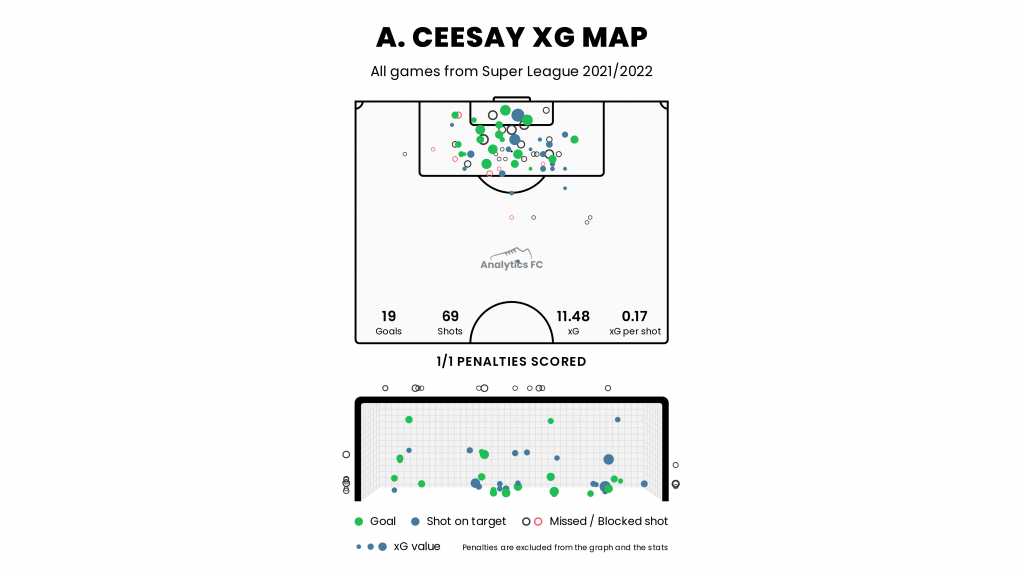
There were a few other departures as well of course, the most notable of which was defensive midfielder Ousmane Doumbia, who started 34 of their 36 league games in 2021/22. These moves happened right at the start of the window since they were contract-related, but there was one unplanned last-minute departure too.
Before we get on to that, we should also acknowledge that the defending champions made some signings too. Among the newcomers were centre-back Nikola Kati? from Rangers, exciting winger Jonathan Okita from NEC Nijmegen and midfielders Cheick Condé and Ole Selnæs, all of whom seemed sensible-enough moves to plug gaps in the squad and replace those that left.
The big question was who would replace Ceesay’s goals, and part of the answer seemed to be Ivan Santini who was brought in from Al-Fateh in the Saudi Pro League, but given his previous record, FCZ must not have seen him as their star striker. Within their squad, they had Aiyegun Tosin, who made 22 league appearances in the title-winning season, as well as an exciting talent coming up who had come off the bench in most of their league matches and grabbed eight goals. His name was Wilfried Gnonto. The young Italian international did feature in the first few matches of the season, but then he was snapped up on deadline day by Leeds United.
Either way, FC Zürich entered the season having done a decent amount of business, but more importantly, having replaced an overachieving manager with one whose most recent tenure ended in disappointment. Foda’s basic style of play was not too dissimilar from Breitenreiter’s in the sense that both of them were comfortable having the minority of possession, but there were serious questions about the former’s ability to get his team scoring regularly enough – especially in the absence of a prolific number nine. Unfortunately, one thing seemed increasingly likely.
The Suffering
To put it bluntly: Foda’s very short-lived tenure at FC Zürich went about as badly as it could have. The only positive was that they managed to qualify for the Europa League after getting the better of Hearts, but their league form under the 56-year-old manager was utterly disastrous and they crashed out of the cup too.
The least anyone would have expected from this appointment was that FCZ would at least preserve their defensive solidity, but that was not the case. They shipped 14 goals in their first seven matches in all competitions, which saw Foda chop and change formations between every single match and go from 4-4-2s and 4-3-3s to the 3-1-4-2 that they had used last season. That change was part of the reason they managed to qualify for the Europa League at least, but he kept changing personnel from match to match which did not help their league fortunes.
It should be said that FC Zürich’s underlying numbers suggested that they deserved a fair bit more than they got on the surface, but some context must be applied to them as well. At the time of writing (22 matches into the season), they have trailed in half of their league matches and only picked up five points from those positions, well down from their 19 points from 17 deficits last season. These game states meant that they were able to pump up their xGD a bit. Even though they have been needing equalisers so often, their attack has been one of the worse ones in the league by all measures.
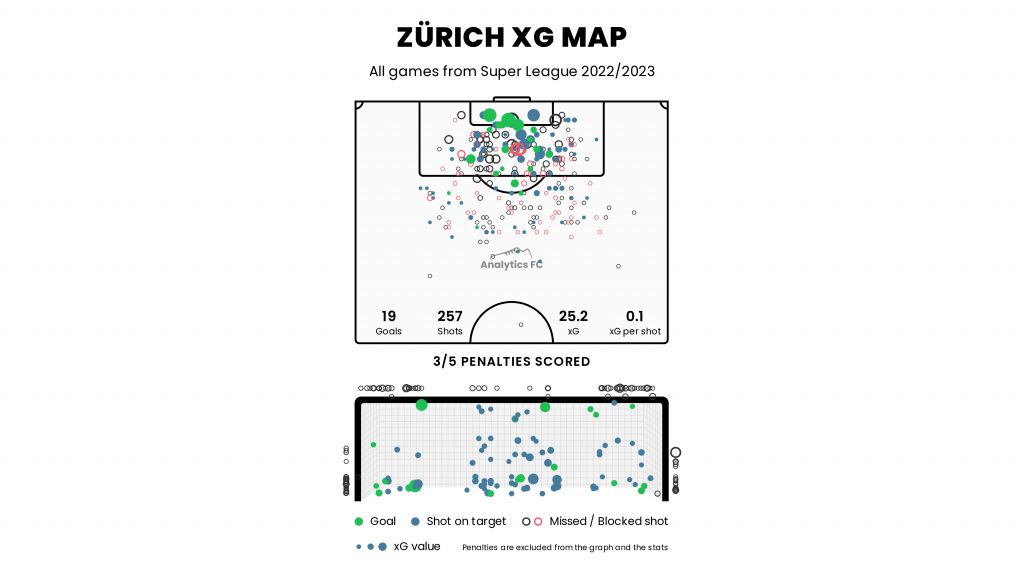
Having watched his side fail at both ends of the pitch, Foda only lasted eight matches before getting the sack. His side were level on points with newly-promoted Winterthur at the bottom of the table with just two points, and they had also lost their first two Europa League group stage matches.
No matter who came next, this was always going to be a season of suffering after this point.
Interestingly, FC Zürich’s next appointment was Bo Henriksen, the Danish manager who had left FC Midtjylland in the summer after a poor start to the season but having come close to a Superliga title in 2021/22. At the moment, it is tough to judge him since he has inherited a squad that he did not build (to his credit, has adapted his tactics well), but he does seem to have them heading in the right direction. They are yet to taste defeat since the World Cup break and have started winning crucial games like the derby again. As the Impact Map below shows, this start puts Henriksen in better overall standing than either previous bosses.
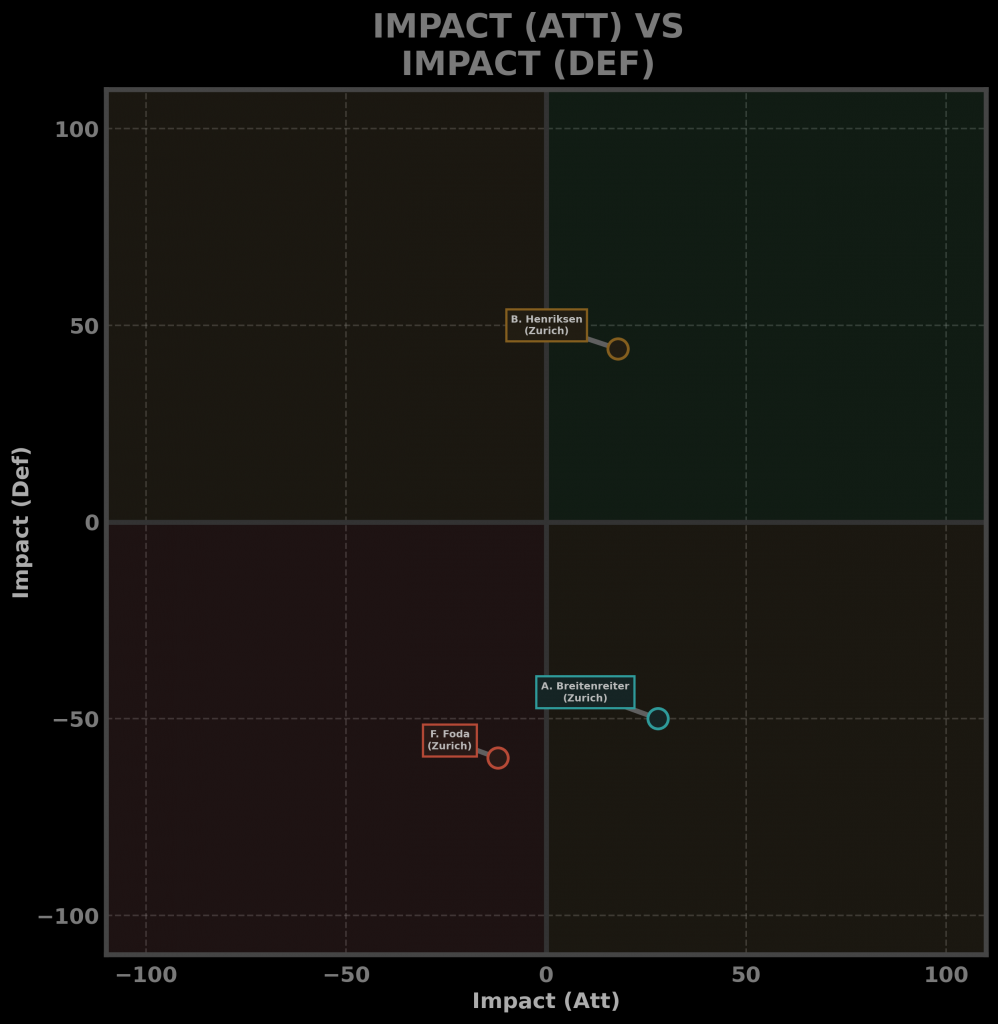
Discussion and Conclusion
In a way, FC Zürich have picked a good time to have a bad season since the Swiss Super League is expanding to 12 teams next season and therefore has no direct relegation, with the bottom team only having to participate in a play-off. They occupied that position for a fair bit, but seem to be pulling away now and are just six points from the last of the potential European spots. Perhaps they could yet salvage something from this campaign.
Either way, though, questions must be asked of the decision-makers. Selecting Foda as Breitenreiter’s successor was a call that never seemed right but failed even more spectacularly than anyone could have imagined, so much so that it might make one think whether there was an element of luck involved in Breitenreiter’s recruitment. But, as this Style Map shows, Henriksen’s team is playing in a very similar way to Breitenreiter’s, so much so that the latter’s name partly obscures the former’s on the map.
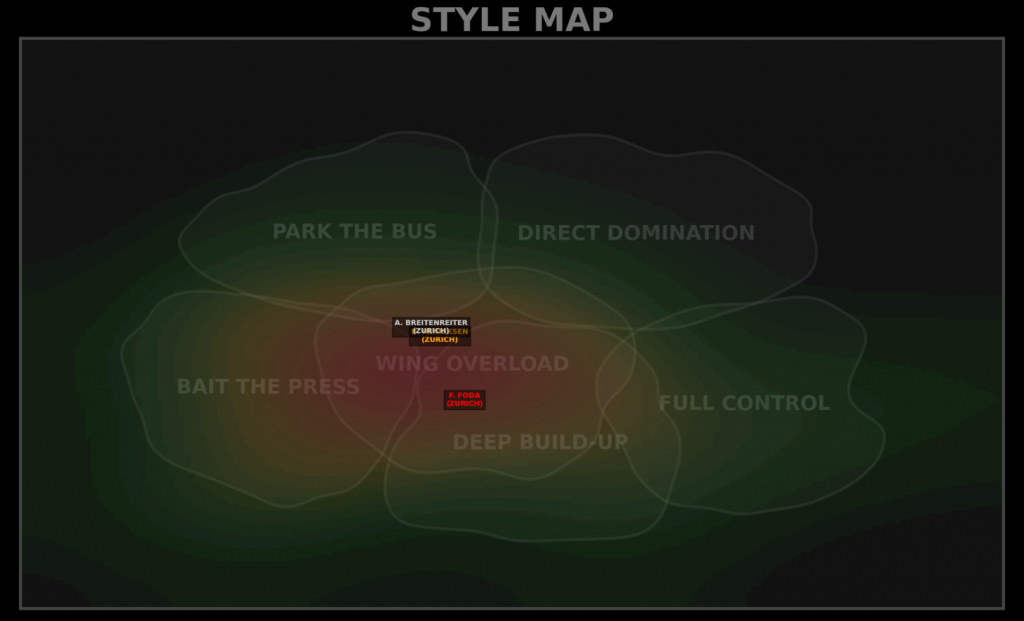
In a sense, the ex-Schalke manager almost did too well for the club’s good. Had they quietly enjoyed a strong campaign finished around third or so there definitely would not have been such a buzz around him, and the club could have continued progressing under him. Still, FCZ were well-positioned to have a respectable season without him as their title-winning squad was not dismantled in any sense, but their decisions have basically taken them back to where they were two years ago.
Now, FC Zürich find themselves in a position where they will definitely not meet their pre-season expectations come the end of the season, so lots of work will be required in the summer. Henriksen has been given a contract until 2024 so he will hope to have the board’s backing in the transfer market and put together a squad that aligns with his philosophy. Ultimately, though, FC Zürich’s total failure to sustain success will see them go from being the defending champions to needing a bit of a rebuild in a year’s time, so this should be taken as a cautionary tale.
Stats courtesy Transfermarkt and Opta via FotMob
Header image copyright IMAGO/Pius Koller

